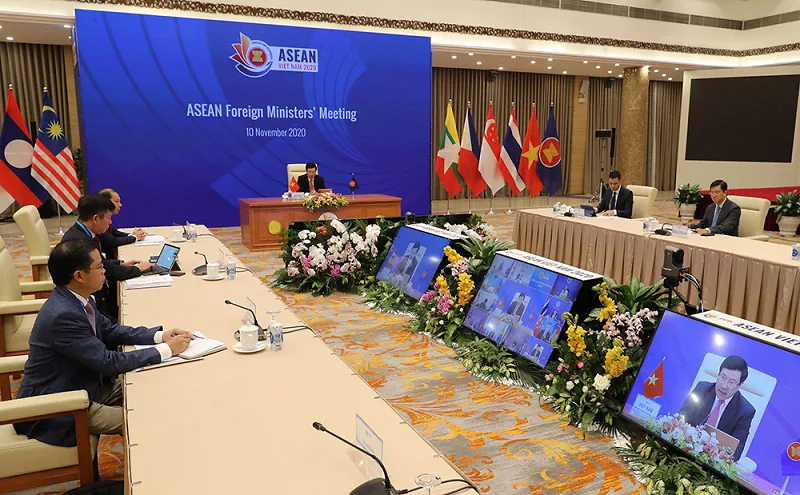South China Sea continues overshadowing ASEAN Foreign Ministers meeting
The foreign ministers called for the full and serious implementation of the Declaration on the Conduct of Parties in the South China Sea (DOC).
All foreign ministers of the Association of Southeast Asian Nations (ASEAN) have agreed that the South China Sea continue to be a challenging issue and posing threats to regional peace and security.
Vietnamese Deputy Prime Minister and Foreign Minister Pham Binh Minh at the AMM on November 10. Photo: Hai Minh |
Unilateral activities, including militarization, unsubstantiated sovereignty claims, and continuous coercion have harmed the stability in the resources-rich sea, top diplomats of the 10-member bloc’s member states expressed concerns at the online ASEAN Foreign Ministers’ Meeting (AMM) held on November 10.
Given this, the countries reiterated ASEAN’s stance and principles of peace and stability in the South China Sea and emphasized the role of international law, including the 1982 United Nations Convention on the Law of the Sea (1982 UNCLOS).
They called for the full and serious implementation of the Declaration on the Conduct of Parties in the South China Sea (DOC), and looked forward to the building of an effective and substantive Code of Conduct in the South China Sea (COC) in line with international law and the 1982 UNCLOS.
For that reason, solidarity is the key factor to ensure peace, stability, independence and self-reliance amidst global uncertainties, Vietnamese Deputy Prime Minister and Foreign Minister Pham Binh Minh said at the meeting.
Vietnam is committed to closely coordinating with other ASEAN countries and China to fully and effectively implement the DOC and soon reach a result-oriented COC in line with international law, especially the 1982 UNCLOS, he pledged.
Pandemic response
| The online ASEAN Foreign Ministers’ Meeting (AMM) held on November 10. Photo: Hai Minh |
The top diplomats discussed ways to maintain economic continuity in ASEAN, agreeing that it is a must to ensure the continuity of supply chains, safely restore trade between countries, sign new-generation free trade agreements such as the Regional Comprehensive Economic Partnership (RCEP), and narrow the development gap in ASEAN by advancing cooperation between sub-regions.
Mr. Minh said it is time for ASEAN to demonstrate its solidarity to complete priorities and initiatives in 2020, realize the ASEAN Community Vision 2025, and effectively cope with emerging challenges, particularly Covid-19.
ASEAN has been aware of joint efforts to connect the member states in maintaining economic links. The representatives have highlighted policy priorities and strategies to mitigate the impact of the pandemic.
They also recommended taking advantage of the pandemic period to change the way things are done towards greater inclusivity, sustainability and resilience.
In addition, the participants discussed digitalization and its indispensable role in the Covid-19 response, recovery efforts and beyond, and highlighted the importance of stakeholder engagement and partnerships in the community-wide recovery.
At the meeting, the ministers also emphasized the role of partnership for the development of the bloc, discussing criteria for dialogue partners of ASEAN, and agreed to admit Colombia, Cuba and South Africa to the Treaty of Amity and Cooperation in Southeast Asia (TAC).
Earlier, Vietnamese Deputy Foreign Minister Nguyen Quoc Dung, head of the ASEAN SOM of Vietnam, said the new wave of the Covid-19 pandemic continues to impact the economic recovery while uncertainties in the regional and global major power competition together with traditional and non-traditional security issues are posing threats to regional stability.

.jpg)











